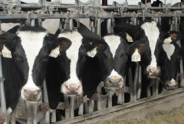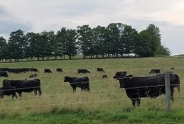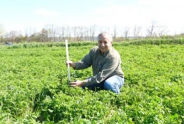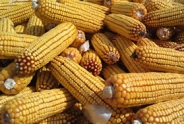Skills and Principles of Managed Grazing on Improved Pastures
Event Details
Date
July 20, 2021
Time
8pm Eastern
Location
Webinar
Host

Presenter: Woody Lane, Ph.D., Lane Livestock Services
Host: Dr. Jay Parsons, Department of Agricultural Economics, University of Nebraska-Lincoln
Time: 8:00 PM Eastern; 7:00 PM Central; 6:00 PM Mountain; 5:00 PM Pacific
Description: Let's say you have a flock of 125 ewes in early lactation, all raising twins. You want to move them into a 3-acre field of improved fast-growing pasture. Question: How long can your flock graze in that field? Or a similar question: How many acres do you need to graze those sheep for 5 days? Or another question: How many inches of grass will a ewe eat each day to meet her nutrient requirements?
This webinar will give answers to these questions and more. We'll focus on "Managed Grazing" - the knowledge of how forages grow combined with the skills of moving sheep, estimating intake, balancing the needs of forages and sheep, and managing pastures by grazing sheep in sustainable and efficient ways. We'll describe how to decide when to open the gate, when to move sheep off the paddock, and practical tips about stocking density, electric fences, weed control, gate latches, the grazing wedge, and a new way of describing grazing systems. Basically, we'll describe how to manage improved pastures to capture sunlight efficiently and profitably. Join us for a very interesting session.
This webinar is made possible with funding support from the American Sheep Industry Association.
After registering, you will receive a confirmation email containing information about joining the webinar.
Upcoming Events
Swine Production Zoom Series
February 5, 2026
February 19, 2026
March 5, 2026
March 19, 2026
April 2, 2026
Register for the whole series or for one or several sessions.
Announcements
Statewide Field Crop Pathology Needs Assessment Survey
Your input is wanted for identifying priorities!Sign Up for Our Weekly E-Newsletter
We send out a bi-weekly e-newsletter that has announcements, upcoming programs, and opportunities for you! Registration is quick, easy, and free. Click here to sign up today!Farmers Can Join MeatSuite For Free!
MeatSuite.com is a free resource provided by Cornell University where NY meat farmers can create a farm profile and list their bulk (wholes, halves, quarters) and bundled (i.e. Grilling Bundle) meat products.Why should farmers join?
1. It's free and easy!
2. Connect with more local customers. In the past year the MeatSuite.com farm directory had 8,300 visits from New York consumers. Farm profiles get as many as 25 views per month from potential local customers. We also spotlight MeatSuite farms on social media and bring attention and purchases to farms through highlights and giveaways.
How do I join?
Farmers can visit https://www.meatsuite.com/farmers/ to create a free farm profile. You must list at least one product for your farm's profile to go live. You'll also have access to Cornell's free Meat Price Calculator, a helpful tool for pricing your meat to make a profit.
While you're on MeatSuite, check out the "Creating Consumer-Friendly Bulk Meats" publication on the log-in page. It has tips on how to create bulk meat products that are easier for first-time buyers to say "yes" to.
If you have any questions as you create your farm profile or products, we're here to help! Please email Matt LeRoux at mnl28@cornell.edu.





